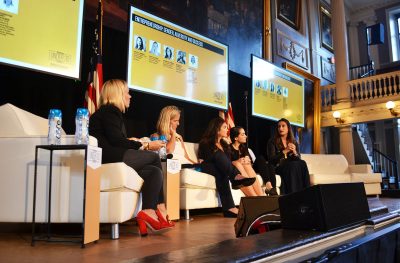
We’ve all heard the age-old, sexist trope: “Can women really have it all?”
At a panel at the Forbes Under 30 Summit Monday, four highly successful entrepreneurs — who just so happen to be women — answered the question for good: yes, obviously.
The panelists, sitting on a stage at Faneuil Hall in front of about 100 attendees, spent 30 minutes answering questions asked by moderator Janey Whiteside, senior vice president and general manager of American Express Global Charge Products and Benefits.
During the forum, titled “Entrepreneurship: Gender, Adversity and Success,” the businesswomen discussed experiences they’d had with gender-based unfairness they’d felt throughout their careers, and how their feelings on the matter has changed as they’ve accumulated more success.
“I actually grew up thinking I lived in a post-feminist world,” said panelist Hayley Bay Barna, co-founder of Birchbox, a company that mails subscribers monthly beauty boxes, and a venture partner at First Round Capital.
Barna explained that even while going through Harvard University and beginning a career in the corporate world, she “literally saw no impediments in [her] way based on [her] gender.” She began to really notice the gender inequality when founding her company, she said.
“It sort of really hit me when my co-founder and I decided to start Birchbox,” Barna said. “We were suddenly in rooms where there weren’t other people who looked like us. And that was just a really big surprise — I didn’t see why that would be that way.”
Barna described that, ironically, because investors weren’t able to personally identify with her business — which mainly targets a female demographic — they would call their wives and ask their secretaries to give their opinions on Birchbox.
Jennifer Hyman, co-founder and CEO of Rent the Runway, said she feels “gender less than [she] did at the very beginning” of her career, though “the bias that exists around female leadership, and the diversity of female leadership” is still an issue of concern for her.
“People feel more comfortable working for a man in many cases — and this is women and men feel more comfortable,” Hyman said. “We feel more comfortable with men being aggressive, with men being assertive, with men having a crazy vision with no idea of how you’re going to get from A to B. And with women, often we need her to back it up. She needs to have 10 spreadsheets behind her that validate that vision.”
Marcela Sapone, co-founder and CEO of the “personal butler” company Hello Alfred, agreed. She added that hard work often makes for a rewarding end result.
“I think women have to do more work,” Sapone said. She later said, “But doing hard work means that over time, you have more confidence and more conviction. And so, these small measures of humility … means that later on, when you make it through the race … you’re going to have something very special in the end.”
Hyman said she hopes to see major changes in this bias in the next five to 10 years. Barna added that there are also added benefits to being a woman entrepreneur, such as being able to identify with and listen to female consumers in a constructive way, and the strengths that come from feeling comfortable with vulnerability and being emotional as a leader.
Sapone pointed out that her personal success — and the other panelists’ success — as entrepreneurs, are correlated to the hard work of businesswomen who have come before them, and said that this contributes to gender becoming less of an issue in the workplace.
“There’s this chain reaction of inspiration where these women actually have to beat down the door a little bit harder than I did,” Sapone said. She later said, “I think what’s interesting is, at least I, and I think other female founders today, don’t bring being a female to the table. You don’t want to start by discriminating yourself.”
Kelly Howard, the president and CEO of Dynamic Biological Systems, said that as a female leader in a male-dominated industry, she found the businesswomen’s advice inspiring.
“Every [one] of my advisors is male, and they’re telling me to approach this like a man — have a pitch deck — because that’s what worked for them,” Howard said. “And I didn’t realize until today, that as a woman … that their advice might not work.”
Hyman brought the panel’s discussion topic to an even higher level.
“We’re at a period of time right now in this election where female leadership is more on the mainstage than ever before,” Hyman said. “And I could talk about subtle biases that exist for me … but what we’re talking about in terms of the overt bias that exists every single day about one of the most qualified women ever running for a position of power says a lot about who we are.”
Hyman was immediately cut off by an eruption of loud clapping and cheers of support by audience members.
“I encourage you to think about … how we could actually be actively supporting other women, and that it matters,” Hyman said. “It matters not just to our politics, but these are the examples we all live by every single day.”























































































































